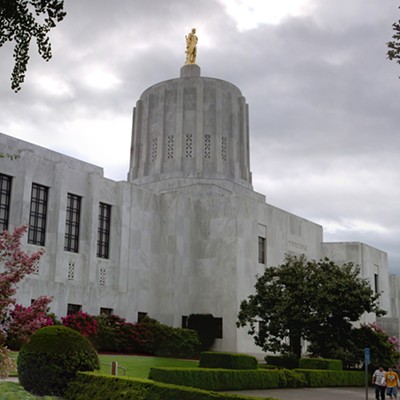The 78th Oregon Legislative Assembly kicked off just shy of two weeks ago. The lawmaking body boasts a Democratic majority, but Bend's Republican representatives—and the City's nonpartisan lobbyist—are wasting no time bringing Central Oregon issues to the forefront of conversations, which are often dominated by Democrats and those living in the western third of the state.
"There are certainly challenges with representing a region outside of the valley and the state's major population centers," explains lobbyist Erik Kancler, who represents the City of Bend in Salem. "But I've found that in most cases legislators, staff, and others are keenly interested in Bend's perspective. Anyone supporting state-level initiatives is going to be interested in how needs vary around the state and we bring a valuable perspective to the Capitol Building."
Kancler says he takes direction from City staff, which makes policy recommendations under the guidance of City Council. Major priorities are centered on core infrastructure and public safety issues; that is, ensuring funding for core sources such as fire, police, water, sewer, and roads.
And though he also lobbies for other cities, including Woodburn and Oregon City, he says that he's careful to avoid taking on clients who might have conflicting needs.
"Cities for the most part have very similar interests and are also very supportive of the rights of other cities to do things differently than they might do them," Kancler explains. "And although some may choose different issues to prioritize than others, conflicts between them are the exception, not the norm."
Things are less agreeable in the legislature, where party line votes are anticipated on a number of major bills—from the push to automatically register qualified Oregon drivers to vote, to a bill aiming to raise carbon standards for auto fuel.
"The biggest obstacle is the partisanship and the concentration of power in a few people's hands," freshman Rep. Knute Buehler (R-Bend) says. "Unfortunately, this has become the way the legislature is increasingly organized and functions."
Still, there are some issues where Buehler sees the potential for bipartisan support, at least on a big picture level. Among them: education spending, mental healthcare and childcare support.
"I believe there is consensus on increasing the K-12 budget—the only debate is how much," Buehler says. "There is broad agreement that our mental health care system needs to be reformed and I am already engaging with the Governor's staff to help with this process. And there is bipartisan agreement on the need to provide more support to families with young children needing childcare—something that I am personally working on with several other legislators."
So far, Buehler is listed as a chief sponsor on six bills, which run the gamut from affordable housing and invasive species to sex trafficking and the release of patient information. He says he plans to introduce or sponsor additional bills focused on education and mental health services.
Buehler's colleague in the state senate, Sen. Tim Knopp (R-Bend), says he'll focus on increasing opportunities for private sector job creation.
"They include biomass legislation, maintaining and expanding tax relief for small business owners as well as tax credits for small business owners and working families," Knopp says. "Additionally, investing more money in the classroom for K-12 and expanding choices for students, parents and teachers [and] increasing funds for career technical education, community colleges and OSU-Cascades."
Other priorities include privacy legislation co-sponsored with Rep. Buehler that would require a warrant to obtain personal communications records from service providers and a bill co-sponsored by Rep. Buehler and Rep. Gene Whisnant (R-Sunriver) that would redirect a larger portion of affordable housing fees back to the counties from which they came.
When it comes to bipartisanship, Sen. Knopp doesn't appear to be holding his breath.
"As of today in the Senate, there haven't been any floor votes, but the low carbon fuel standards bill will likely be fairly partisan with one Democrat joining Republicans voting no on an untested program that increases gas prices," Knopp says.
For his part, Rep. Buehler seems more hopeful about the potential for aisle-crossing collaborations. And it should be—it was a core component of his campaign.
"Oregon faces some serious challenges—the challenge of creating an economy with enough good quality jobs that no one is left behind, the challenge of supporting and reforming our schools so that our children are ready to compete globally in the 21st century, and the challenge of balancing the need for a government ambitious enough to improve people's lives with the government taxpayers can afford," Buehler explains. "We can meet these challenges but it will take straight talk, creative thinking and hard choices from all lawmakers."

























